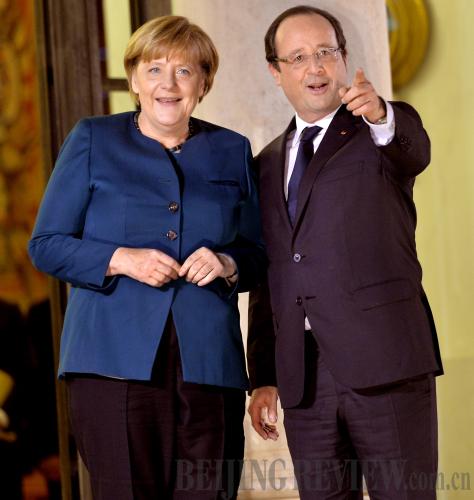|
 |
|
WORKING TOGETHER: French President Francois Hollande meets with newly reelected German Chancellor Angela Merkel during her visit to Paris on December 18, 2013 (CHEN XIAOWEI) |

The woes of the EU after the most prolonged recession in modern times are, finally, at the end of their worst phase. The battle to stabilize the euro is now largely over. Mario Draghi, President of the European Central Bank, who has been at the center of many of the efforts over the last few years to supply some much-needed stability and certainty into jittery European markets, stated in an interview on January 23 that "the economy in the currency area is growing again."
But there were still clouds in the sky, with a jobless rate across the zone of 12 percent and a growth rate of only 1.2 percent predicted in 2014. That, however, is a vast improvement over 2013, when the zone contracted by 0.4 percent.
Cautiously optimistic
This message of low-key optimism is wise. Over the last few years, there have been many false dawns. The global economic crisis of 2008 was followed in 2009 by the array of problems in the EU—in Greece, Ireland and then Portugal. As a whole, during the worst phase in 2010-11, it looked like there was a real chance the euro project might fold. Italy, one of the zone's largest economies, came precariously close to defaulting on its debt. Seeking money on the international markets pushed Greek interest on debt up over 6 percent.
Draghi has made clear in this and other recent comments that people should not get too punch drunk now that the stabilization has happened. While it is a significant achievement that despite the worst travails, the euro zone stayed together, there are still uncertainties about the economic and political future, which jeopardize what is now being called the recovery stage.
The good news is that nations badly affected by the collapse of the construction sector and of finance like Ireland have emerged from their bailout packages and are returning to growth. Consumption in the euro zone and the EU generally is up, and confidence is returning. The UK, having implemented some of the harshest austerity measures in its history, has been given a clean bill of health by the International Monetary Fund despite earlier criticisms that its cuts in government expenditure were too deep and too fast. Growth in the last quarter of 2013 prefigures an estimated 2 percent in 2014. This is a good outcome when we look back at the predictions late in 2012 that the UK was in real danger of going into a triple-dip recession.
The bad news, however, remains the same. Youth unemployment in Europe is too high. In Ireland, Spain and Portugal, there is a generation of people who have never had full time work. Jobs are precious, and competition fierce. France, one of the major economies, has been stuck in low growth and high unemployment for too long, and the attempts by President Francois Hollande to reenergize the economy with his package of measures in mid-January were criticized by some as being too little too late. The costs of welfare and inefficiency in parts of the economy in France have made it uncompetitive. This is a much deeper issue than the taxation of over 75 percent on the wealthy. French industry remains overregulated, and the agricultural sector, still so important for employment and growth, is inefficient. Hollande is fighting not just against administrative changes but also profound cultural ones. He has a hard battle ahead of him, with the lowest approval ratings of any modern French leader.
|
